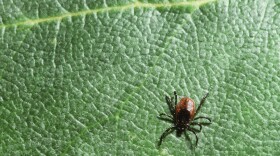-
More than 2,000 cases of Lyme disease are reported each year in Connecticut. Tick-borne diseases have become more prevalent in recent years because the bugs prefer warmer weather, and temperatures are rising.
-
Dr. Megan Linske, a vector ecologist with the Connecticut Agricultural Experiment Station, said she's seen changes in new tick species since the study program began five years ago.
-
The Town of North Hempstead has a unique way of controlling its tick population. WSHU’s Sabrina Garone spoke with Eric Powers of the Center for Environmental Education and Discovery in Brookhaven. He said ticks are a favorite snack of the bobwhite quail!
-
U.S. Sen. Kirsten Gillibrand (D-NY) wants to increase federal funding to research Lyme disease and other tick-borne illnesses.
-
It’s spring — and warmer weather brings ticks. Tick-borne illnesses in Connecticut have been on the rise in recent years, according to scientists at the state’s Agricultural Experiment Station.
-
The virus is transmitted to humans from infected deer ticks. Symptoms are usually flu-like, but can be severe.
-
The Stony Brook Southampton Hospital’s Regional Tick-Borne Disease Center, the first and only of its kind on Long Island, will treat children and adults for tick bites and diagnose tick-borne diseases.
-
The Connecticut Agricultural Experiment Station is concerned about new species of ticks that were found hitching a ride on residents returning from international travel.
-
U.S. Senator Chuck Schumer (D-NY) visited Long Island, announcing $160 million in federal funding to support tick research, surveillance and education in Nassau and Suffolk counties.
-
After a mild winter in the U.S., scientists are watching to see if there will be an uptick in ticks this year. More ticks this spring could mean a wider spread of Lyme disease and other infections.
Play Live Radio
Next Up:
0:00
0:00
Available On Air Stations







